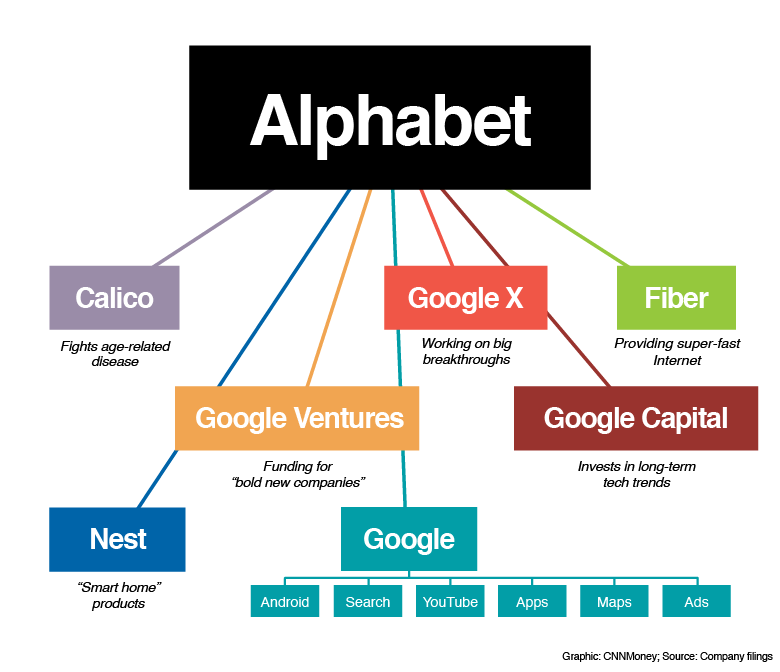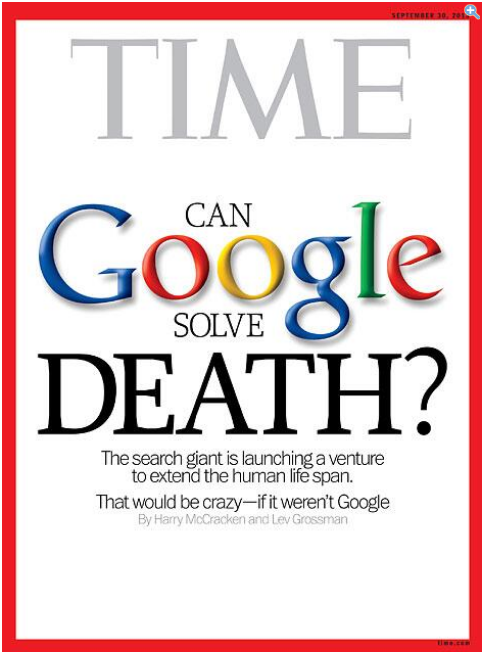Everyone is talking about the changes at Google, and it really doesn’t matter if we think it’s good or bad (although I think it is a good thing). They are Google, and they will do. They are so ginormous that even if this wasn’t the right thing, they’ll just change and go in a different direction if need be. Bottom line: just go with it and see what they do. But what are they doing? Specifically, in healthcare? This is an area they have been a little fuzzy on direction, but that has changed over the past 2 years. Let’s take a look at what some of the top healthcare challenges Google is taking on. In addition, one of their initiatives called Calico, has now become a main component of the new structure –Alphabet Inc (also check out the Google Alphabet announcement at ABC.XYZ and look for the easter egg too).
What is Calico?
Calico is an independent research and development biotech company established in 2013 by Google Inc. and Arthur D. Levinson with the goal of combating aging and associated diseases. The name Calico is shorthand for California Life Company. In Google’s 2013 Founders’ Letter, Larry Page described Calico as a company focused on “health, wellbeing and longevity.” In August 2015, Google announced plans to restructure into Alphabet Inc., wherein Google and Calico would become two of the main units of the new company.
“We’re tackling aging, one of life’s greatest mysteries.”
Calico is a research and development company whose mission is to harness advanced technologies to increase our understanding of the biology that controls lifespan. We will use that knowledge to devise interventions that enable people to lead longer and healthier lives. Executing on this mission will require an unprecedented level of interdisciplinary effort and a long-term focus for which funding is already in place.
According to Healthcare Dive, here are 4 of the biggest healthcare challenges Google is tackling
- Researching cures for age-related diseases. The researchers from Google’s Calico team have partnered with several outside organizations to study the biology of aging and to develop potential interventions that will slow aging and counteract age-related diseases. Google’s Calico team is comprised of scientists from the fields of medicine, drug development, molecular biology and genetics.
- Detecting and fighting cancer. In 2013, Google filed a patent for a wearable device that would target cancer cells by sending magnetic nanoparticles into a patient’s bloodstream. “The binding of the particles to the targets allows the targets to be selectively modified or destroyed by energy from outside the body such that the adverse health effects are reduced or eliminated,” the patent application says. Last October, Google also announced it was working on development of a pill that it hopes will detect cancers and other diseases by sending magnetic nanoparticles into the bloodstream.
- Shifting from treatment to prevention. Last summer, Google began an ambitious project to collect genetic and molecular information from anonymous donors to create a picture of what it means to be a healthy human. The ultimate goals of the project, known simply as “Baseline Study,” are much earlier detection of major health issues, such as heart disease and cancer, and a shift of focus from treatment to prevention.“With any complex system, the notion has always been there to proactively address problems,” Andrew Conrad, head of Google X’s Life Sciences team, told The Wall Street Journal. “That’s not revolutionary. We are just asking the question: If we really wanted to be proactive, what would we need to know? You need to know what the fixed, well-running thing should look like.”
- Simplifying glucose monitoring. Early last year, Google unveiled a prototype of a contact lens that monitors glucose levels in tears. The lens uses a minuscule glucose sensor and a wireless transmitter to monitor blood sugar so that insulin doses can be adjusted accordingly. The lenses are not expected to be available to consumers for at least another four years. Google last month forged a partnership with pharmaceutical company Novartis to work on a contact lens that can monitor blood glucose levels.
“Over 29 million Americans have diabetes”
– US Centre for Disease Control and Prevention.
Google to collaborate with DexCom on diabetes monitoring products
Bandaid sensor and health tracking band
“The small sensor, which will be the size of a Band-Aid, will sit on the skin and constantly monitor blood sugar levels rather than relying on finger pricks. The sensor and algorithms will connect with Google hardware and its cloud for a strong data platform. This collaboration is another step toward expanding monitoring options and making it easier for people with diabetes to proactively manage their health,” stated Andrew Conrad, head of the Life Sciences team at Google, in a statement. DexCom estimates that the sensor will be commercialized within the next five years.
The glucose monitoring device is not Google’s first step into the development of medical devices, as the Life Sciences team is also working on a health tracking wristband that will track temperature, pulse, and heart rhythm. In addition.
At the end of the day, Google is 100% dedicated to healthcare in the world. Where they land with solutions over the years to come will be most interesting to watch. These are exciting times for Google. They have no promise of a product or return on investment, but they know that moonshots have paid off big in the past. And part of their belief is not surrounded by money, but of hope.
For fun, here are 10 World-Changing Futuristic Google Projects (some have already happened.)

